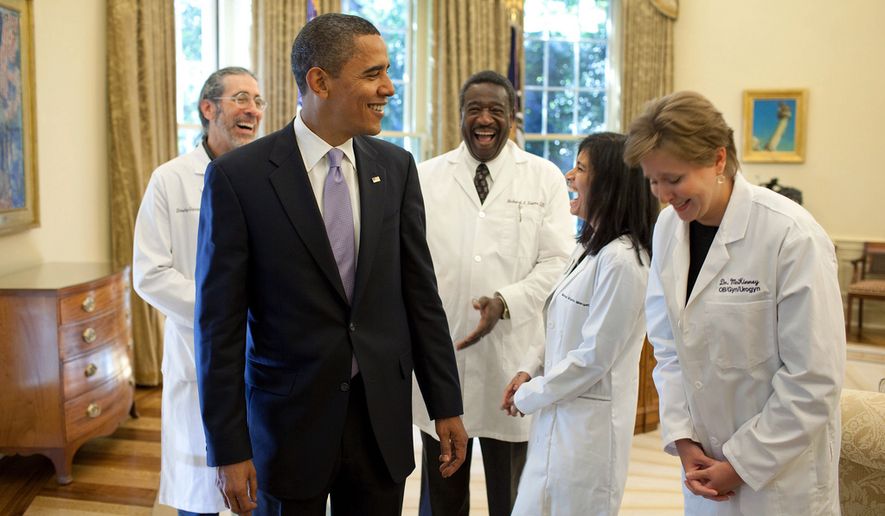Up to 30 million taxpayers will claim an exemption from Obamacare on their tax forms this year, the administration predicted Wednesday as officials tried to prepare the country and a skeptical Congress for the first wave of tax penalties under the Affordable Care Act.
Most Americans get insurance through their jobs or from a government program such as Medicaid, and will only have to check a box on their tax forms.
But up to 5 percent of taxpayers bought insurance using government subsidies and will have to go through a complicated reconciliation process on their tax forms. As much as 4 percent of taxpayers ignored the law and will end up paying a penalty, and perhaps 20 percent — or 30 million taxpayers — will be granted an exemption from the law, meaning they will escape the tax penalty altogether.
Federal officials said the numbers could also be somewhat lower, but they have no clue what to expect since Obamacare only went into full effect last year.
“This is the first time going through the process, and so we’re not exactly sure how many are going to claim an exemption,” a senior Treasury Department official told reporters on a conference call, demanding that he not be named in articles in order to answer specific questions.
Obamacare critics have argued that the administration has created exemption loopholes that make it too easy to avoid the tax penalty.
PHOTOS: Bang for your buck: Best handguns under $500
Exemptions are available for those who were homeless, faced eviction, got a shut-off notice from a utility or had their employer-sponsored plans canceled and simply believed they couldn’t afford a plan on their own.
Illegal immigrants are also not required to pay the tax penalty.
The government’s efforts to keep up with the first Obamacare tax season come even as the Obama administration is fighting in court to keep the tax subsidies in place.
Opponents have filed a challenge with the Supreme Court over the subsidies, arguing that the health law says they can only be paid to those using exchanges “established by the state” — a phrasing that they said excludes those who live in states that refused to set up their own exchanges and instead rely on the federal HealthCare.gov portal.
About two-thirds of states rely on the federal exchange, and lower courts have split on whether the law bars them. The Supreme Court is expected to rule by June on the challenge.
Opponents, pointing to comments from some Obamacare defenders, say Congress had intended to use the subsidies as a way to entice states to set up exchanges rather than leave the job to federal officials.
PHOTOS: 12 sun-splashed cities to see before you die
In particular they point to former Sen. Ben Nelson, a Democrat who was one of the key final votes to getting the bill through the Senate, and who insisted that states be able to set up their own exchanges. The opponents say the subsidies were created as an incentive to get states to set up exchanges.
But Mr. Nelson this week wrote a letter saying he “always believed that tax credits should be available in all 50 states regardless of who built the exchange, and the final law also reflects that belief as well.”
That letter was part of a filing by Democrats, led by Senate Minority Leader Harry Reid and House Minority Leader Nancy Pelosi and joined by other key authors of the Affordable Care Act, telling the justices that when they wrote the law, they had intended for consumers in all states to be eligible for subsidies.
They said they weren’t trying to create incentives for states one way or the other.
“It would make no sense to hide such an important condition in such an obscure subsection,” the lawmakers said in their brief, which was filed for them by the Constitutional Accountability Center.
Part of the problem Democrats face is the convoluted way the law was passed.
Senate Democrats forced their bill through on Christmas Eve 2009, expecting to eventually work out differences with the House, which passed a different bill. But Scott Brown’s victory in a special Senate election in Massachusetts cost Democrats their filibuster-proof majority, and Mr. Reid and Mrs. Pelosi had to resort to using budget gimmicks to force the bill through exactly as it passed the Senate, meaning they didn’t have time to tweak the law, fix drafting errors or make other corrections.
House Republicans who oversee health issues wrote a letter to the Department of Health and Human Services on Wednesday warning it to begin preparing in case the Supreme Court rules against it.
“Given HHS’s responsibilities, we believe it is prudent that the department plan for the full range of potential outcomes and consequences of the court’s decision,” the GOP lawmakers wrote.
For its part, HHS, which runs HealthCare.gov, said it is on track to mail out the 1095-A tax forms exchange customers will need to figure out whether they calculated their subsidies right throughout last year.
Exchange customers were supposed to estimate their earnings during 2014, and the government paid out subsidies based on those estimates. Now that the year is done, they are required to reconcile their actual earnings with their predictions.
Officials said they expect between 3 percent and 5 percent of taxpayers will have received subsidies in 2014, but they couldn’t predict how many of those were underpaid and will get refunds, nor how many were overpaid and will have to repay some of the subsidies.
• Stephen Dinan can be reached at sdinan@washingtontimes.com.




Please read our comment policy before commenting.